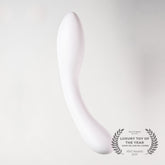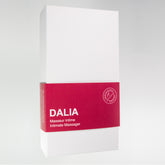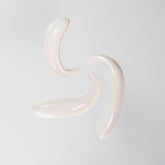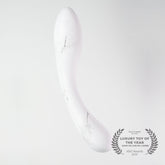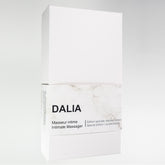Toxic-free Pregnancy
What Products Should I Avoid When Pregnant?
How to Have a Healthier Pregnancy!
As you might suspect, here at Désirables, we try to live a life free of toxic products as much as possible. Of course, we're not perfect and we do let our guard down from time to time. But when one of us became pregnant, we realised pretty quickly that a lot of “go-to products” that are usually recommended on well-known websites and blogs actually contain A LOT of toxic components. These are not only harmful to you, but to your growing baby as well.
In this blog post, we’ll talk about the products you should avoid in categories such as food, body care and pelvic floor training and we’ll offer some local and safer options.
Food 🍲
You’ll notice that one of the first things you have to be careful of is food, especially in the first trimester. There are a plethora of things that are suddenly not recommended for you, let it be cheeses, sushis, alcohol or a variety of herbal teas.
Nitrites 🌭 🥓 🍕
Nitrites and nitrates are additives that are usually added to cured, smoked or processed meat (bacon, deli meats, sausages, hot dogs, etc.) in order to preserve them for longer periods. Those chemicals are known to be carcinogenic (may cause cancer). However, nitrates are naturally present in some food (spinach, bok choy, lettuce and carrots) and these are part of a healthy diet. So where to draw the line? To be safe, try to aim for the natural sources of nitrates. And in short, you want to make sure that your ingredients contain no nitrites and no celery powder (a more natural alternative to chemical nitrites/nitrates). Fortunately more and more companies are starting to offer products that are nitrites free.
Be careful: ham is one of the biggest culprits in terms of nitrites! If you live in the province of Quebec, there are 2 good options if you are craving that ham and cheese sandwich:
- Ham cooked bio from Le Betron
- Black forest Smoked ham from Le Breton
Olymel and Première Moisson also offers meat options without nitrites.
Decaf ☕
One of the first things you are told to stop (or reduce) when you become pregnant is your caffeine intake. But what most people don’t know is that depending on the decaffeination process your decaf coffe may be more dangerous for you than regular coffee.
In fact, a recent independent study by the Clean Label Project put into light that some leading brands of decaffeinated coffee sometimes contained surprisingly high levels of Methylene Chloride - a solvent linked to cognitive impairment, asphyxiation and cancer.
Surely there is a safe way to decaffeinate your favourite drink? Yes, the key is in the process that will be used! You want to find a brand that uses the “ Swiss WaterⓇ” decaffeination process. This process is based on a series of water-filled tanks, filtration and basically time.
➡️ Did you know that the Swiss Water Method facility is actually based in Vancouver?
Parents.com offers a comprehensive list of “safe” options. Our favourite decaf options at the office are “Kicking Horse Coffee”, you can find it in your groceries’ Bio Section, and “Flor de Cana” available online. If you are a fan of small roasters, there is a good chance that their decaf option uses the swiss water method - simply ask them! For quick shopping, Swiss Water also has a good selection directly on their online shop.
Body Care 🧴
Ingredients to Avoid 🚫
According to the David Suzuki Foundation, there is a dozen ingredients that shouldn’t be in your body products:
- BHA and BHT
- Coal tar dyes: p-phenylenediamine and colours listed as “CI” followed by a five digit number
- DEA-related ingredients
- Dibutyl phthalate
- Formaldehyde-releasing preservatives
- Parabens
- Parfum (a.k.a. fragrance)
- PEG compounds
- Petrolatum
- Siloxanes
- Sodium laureth sulfate
- Triclosan
We also learned that Retinol is another ingredients to avoid especially when taken orally as it could cause birth defect. OB-GYN do not recommend it even for skin care products!
Some of those ingredients are banned in some parts of the world, controlled or at least known as carcinogens (can cause cancer). For the complete explanation on these ingredients, we invite you to read this David Suzuki Foundation’s great PDF document (a quick read of 19 pages).
A good rule of thumb is to go for products that have ingredients you are able to pronounce! Plus, a short ingredient’s list or organic / bio options are always a good indicator.
Belly Cream 🤰
Either to avoid an itchy belly or if you want to “try” to avoid stretch marks there are a few great lotion/butter/cream options out there that are also safe for your body and for babies.
- ❤️ Earth Mama - Belly Butter. Don’t get fooled by the name “butter”, this cream is really smooth and light. Personally of all the tested cream/butter this one is my favorite for it’s smell and light texture. Made in the USA.
- Prenatal Ease - Hydrating Lotion. This option is definitely the one that the designer in me loves the most. The packaging is simply gorgeous. The smell is also pretty decent and the texture is a bit more dense, more like a soft butter. And it’s made in Canada which is always a plus.
- Lolo - Belly & Body Cream. This option is actually made in Quebec! The packaging is also pretty and this type of bottle is perfect if you care about using all the lotion inside (contrary to the options with pumps, where there’s always some left at the bottom of your bottle). The texture is pretty thick and you might feel like you're putting sun lotion more than body lotion, but for some people that’s exactly what they like. The smell is a bit less fruity than the other options and personally I was not a fan, but it might just be my new and temporary pregnant sense of smell.
- Attitude - Blooming Belly. We just love this company in general for their variety of products. Made from argan oil, this option is perfect for tighter budgets. The blooming belly series is actually a great option for expecting moms. I’ve not tried this one specifically, but usually Attitude’s products are pretty well balanced and if you are a fan of argan oil, it’s generally present in their body products.
We want to let you know that it’s perfectly natural and beautiful to have stretchmarks and no matter how much cream or hydration you give your body, avoiding stretch marks might not even be an option depending on your genetics. So we invite you to embrace those signs that your body grew a human from scratch!
Nipple cream 🤱
For the first few weeks of breastfeeding, for those of you who will choose this option, your nipples and areolas might become dehydrated, cracked and even have blisters in some cases (oh the joy of motherhood 🙃). Fortunately you have a few options available on the market in order to give your breasts a well-deserved hydration treatment, they are usually called “nipple cream” or “nipple butter”. Here’s a few option with baby and body-safe ingredients:
- Breast milk, one of the cheapest and easiest options is actually to use your own breast milk to rehydrate and treat the affected zone. (Most natural and accessible option)
- Cabbage leaf, this is another simple option that can be easily available. This technique has been used by our grandmother’s grandmothers and is useful to reduce engorgement as well as breast pain and swelling. (Accessible and natural option)
- Motherlove - Organic Salve, can also be used as a diaper rash ointment. Its organic ingredients make it safe for your baby to ingest in case there is some left from your last feeding. (Bio option)
- Earth Mama - Nipple butter, an option that is lanolin (a wax secreted by wool-bearing animals to protect and waterproof their coats) and gluten-free. (Vegan option)
- Coconut oil is also a great alternative, with its antibacterial and antifungal properties. We would advise to make sure that you don’t have any left before your next feeding if your baby is still only breastfeeding (or under 6-8 months).
Some sources will say to use honey but it seems like a very big risk especially since honey can give botulism to babies under 2 years of age. So stick with the safe options.
For more information you can always ask a Doula, breastfeeding consultant or use resources from breastfeeding associations and online groups like La Leche League.
Pelvic Floor Training Products 💪
Training your pelvic floor is an essential part of getting ready to give birth, especially if you wish to have a vaginal birth. A healthy and strong pelvic floor will help you during the pushing phase of the birth and should also reduce the time needed to regain your pelvic postpartum (meaning you are less likely to have urinary incidents for the weeks following birth or a prolapse).
Like any other product that comes in contact with your body (especially internally), you want to make sure that you have products that are body-safe and hygienics. The same rules that we share with you in our Body safe sex toys’ blog applies to body safe pelvic floor tools and exercisers.
We ALWAYS advise that you consult a pelvic floor health specialist before starting any pelvic floor training. Especially when pregnant since your ligaments and muscles are more relaxed thanks to the Relaxin (a natural hormone that helps create more space in your pelvis) that your body creates. Your PT will give you some exercises to get more tonus, but can also evaluate if there are other issues that you should take care of.
You don’t absolutely need physical tools to help you train your pelvic floor, but if you want some you should consider our Dalia. It can be used to train your pelvic floor AND help you with your perineum massage.
Conclusion
We hope this quick guide has helped you to navigate some of the health aspects of your pregnancy. If we are so bold as to suggest more of our products, we must admit that a good massage is divine when you are feeling back or leg pain due to your belly getting bigger and heavier. We suggest you use an organic massage oil, such as the one we created or a massage candle. The warmth of the melted wax will give an extra relaxing touch!
💡 Did You know? 💡
You can use our Adori porcelain massage stones to slightly alleviate the pain during childbirth by using them to put pressure on your pressure points. It's a small accessory that you can put in your hospital bag that can make a big difference!
Sources:
- https://www.journaldemontreal.com/2020/08/29/le-jambon-sans-nitrites-artificiels-au-banc-dessai
- https://www.webmd.com/diet/foods-high-in-nitrates#1
- https://www.bbc.com/future/article/20190311-what-are-nitrates-in-food-side-effects
- https://www.hellomotherhood.com/article/443074-can-pregnant-women-eat-nitrites/
- https://www.livescience.com/36057-truth-nitrites-lunch-meat-preservatives.html
- https://coffeeconfidential.org/health/decaffeination/
- https://www.parents.com/pregnancy/my-body/is-it-safe/can-you-drink-coffee-when-pregnant/
- http://www.scientifique-en-chef.gouv.qc.ca/impacts/ddr_feuilles-de-chou-efficaces-soulager-montee-de-lait-plutot-vrai/#:~:text=%C3%80%20celles%20qui%20optent%20pour,au%20cong%C3%A9lateur%20pendant%2015%20minutes


